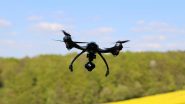Islamabad, Nov 25 (PTI) Two retired Pakistan Army officers have been court-martialed for inciting sedition, the army announced on Saturday, indicating that controversial military court trials of those accused of unprecedented violence against military installations on May 9 have begun.
Major (Retired) Adil Farooq Raja and Captain (Retired) Haider Raza Mehdi were court-martialed and they “were convicted and sentenced through Field General Court Martial (FGCM) under Pakistan Army Act, 1952 for the charges of inciting sedition among army personnel,” the Army said in a statement.
Also Read | South Korea Horror: True Crime Fan Stabs Stranger Over 100 Times ‘Out of Curiosity’, Gets Jail for Life.
They have also violated the provisions of the Official Secrets Act, 1923 related to espionage and acts prejudicial to the safety and interest of the State, it said.
Major Raja was sentenced to 14 years of rigorous imprisonment, while Captain Mehdi was given 12 years of rigorous imprisonment. Both of them have been living abroad and were sentenced in absentia.
The court of competent jurisdiction convicted and adjudged both the individuals on October 7 and October 9, 2023, through due judicial process, the statement said, adding that the ranks of both officers were forfeited on November 21.
Senior journalist Mazhar Abbas told Geo News that Raja, who is known for his pro-Imran Khan stance, and Mehdi host vlogs on Youtube have been critical of the senior Army leadership through their social media posts and said he (Abbas) believes this is the beginning of the trials of people who were convicted after May 9 in military courts.
Hundreds of former prime minister Imran Khan's supporters had stormed military and government installations, and even torched a general's house, following the brief arrest of the chairman of the Pakistan Tehreek-e-Insaf (PTI) party by the Punjab Rangers on May 9 in an alleged corruption case.
Pakistan's powerful Army, which has ruled the country for roughly half of the country's history, has its own laws and courts, and military officers accused of wrongdoing are always tried behind closed doors.
However, after hearing multiple petitions, Pakistan's Supreme Court, on October 23, declared the trial of civilians in military courts as “null and void” and ordered authorities to conduct the hearing of the cases of former prime minister and Pakistan Tehreek-e-Insaf (PTI) leader Imran Khan's supporters arrested for their involvement in the May 9 violent protests in ordinary criminal courts.
The decision to use military courts was taken by the government of prime minister Shehbaz Sharif, who has since completed his term in August and handed over to a caretaker government to oversee the general elections to be held on February 8.
On November 20, Pakistan's caretaker Prime Minister Anwaarul Haq Kakar had supported trials by military courts as he said: “If the people attack an institution, which is responsible for saving the country from anarchy, they should be tried in military courts as per the law.”
Several review petitions, including by the Ministry of Defence, the Intelligence Bureau, the Pakistan Tehreek-e-Insaf (PTI) party, Pakistan Electronic Media Regulatory Authority, Election Commission of Pakistan, the Muttahida Qaumi Movement party as well by former minister Sheikh Rashid and Ijazul Haq (son of former dictator Ziaul Haq) were also filed against the original judgment.
The Pakistan government and several provincial governments, including those of Khyber-Pakhtunkhwa and Balochistan as well as the Defence Ministry have filed appeals against the judgment.
Pakistan Muslim League-Nawaz (PMLN), Pakistan Peoples Party (PPP) and Jamaat-e-Islami (JI) have been protesting and contesting in the Senate since November 15 when a resolution was passed rejecting the Supreme Court's verdict on military courts.
(This is an unedited and auto-generated story from Syndicated News feed, LatestLY Staff may not have modified or edited the content body)













 Quickly
Quickly

















